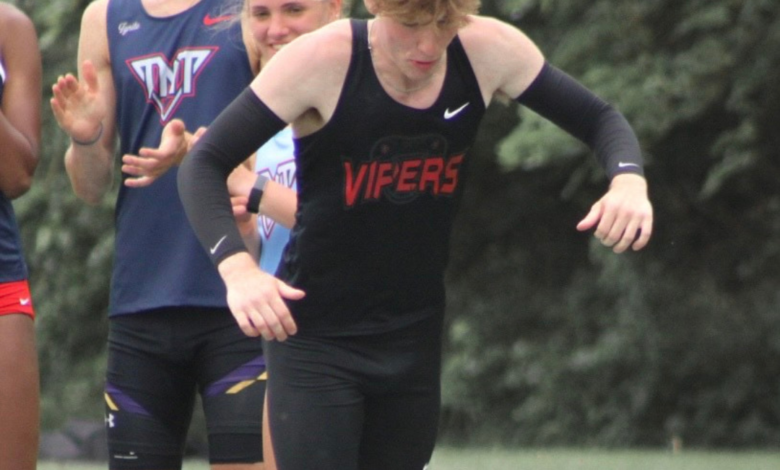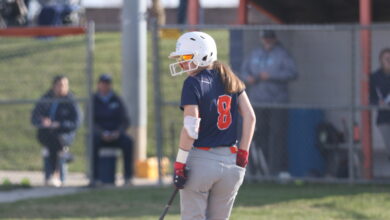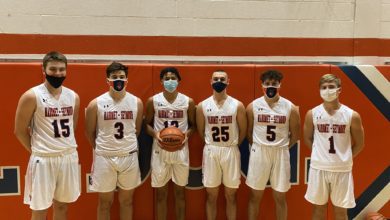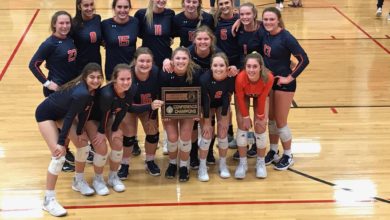Cole Marshall to triple jump at Illinois Wesleyan University

By FRED KRONER
Cole Marshall started his track and field career as a middle-distance runner in junior high until he discovered an event in high school that he could call his own.
Then he took a leap of faith and jumped into a brand new event.
The results were staggering. Marshall finished his Mahomet-Seymour career as one of the best triple jumpers in school history, as an All-State performer and will have the opportunity to continue to compete in college at Illinois Wesleyan University, in Bloomington.
His transformation took place within a three-year span.
He was briefly introduced to the triple jump as a freshman with the Bulldogs.
During the indoor season of 2020, Marshall was focusing on the 60- and 200-meter sprint races.
“At one of our home meets, I was watching some guys doing something I hadn’t seen before,” Marshall recalled. “I went over to ask Noah Powell, a former triple jumper at Mahomet, what it was.”
Marshall was given the basics and unabashedly gave it a try.
“Sure enough, after about 10 minutes of learning it, I felt comfortable,” he said. “In that moment, I knew I found my event.”
There was just one problem.
“I was set to jump in my very first meet, and then COVID hit that same day,” Marshall said. “I never got to jump my freshman year.”
Though disappointing at the time – the entire outdoor track season was canceled in 2020 by the IHSA – in retrospect, Marshall is not convinced it hurt his development.
“I don’t know if that was a good or bad thing for me, to be honest,” he said. “It hurts knowing that if I had my full freshman season, I could have had more years of practice, but with triple jump, it’s so technical that as a freshman, I could have built worse habits in the jump than I already had my sophomore year.
“To this day, I don’t really know. I’m just thankful for God and having a plan for me all along and trusting his process.”
Once Marshall became a full-time triple jumper as a sophomore at M-S, he wasn’t an immediate sensation.
His best mark that year in 2021 was 38 feet, 7 ¾ inches.
It was following his sophomore season that Marshall committed himself to turning into a college athlete.
“I was far behind though,” he said. “Not really being around track in general really stunted my goals and aspirations into a much shorter time frame.
“I knew for my last two years of high school I would have to really work to get where I wanted to be. I had no idea how any of the college recruiting process worked.
“It was all a process of learning as I went. I had my resources like my counselors, but inevitably I needed to get a grasp of what I wanted.”
Marshall extended his triple jump PR by more than 31 inches as a junior (when he placed 14th at state) to 41-3 ¼.
As a senior, he landed a jump of 42-11 ¼, which ranks sixth on the all-time career leaders list at M-S. At the state meet in May, Marshall captured the fifth-place medal in Class 2A.
The end-of-the-season numbers are impressive, but what Marshall felt he was missing – until this spring – was consistency.
“I hit a massive PR my junior season indoors and that’s when I really started getting looks (from college coaches).” he said, “but after a downward spiral of an outdoor season, I didn’t get better until my last jump at sectionals to qualify for state.
“I had a very early peak my junior year, which I learned from and tried to change for my senior season. That summer (of 2022), I got consistent, every meet hitting a small PR and then again at the U of I, I hit another foot PR.”
The improvement was satisfying, but it came at a cost.
“I was beyond excited, but I already knew in track what happens your junior year is more important than your senior year,” Marshall said. “It’s so hard for late (in the school year) sports because most colleges are done recruiting their top positions by indoor of senior year.
“I still got a lot of interest, but no big offers that I was hoping for.”
Still, Marshall had an abundance of options.
Besides Illinois Wesleyan University, he was actively recruited by Carroll College, Chicago State, Eastern Illinois University, Florida Tech, Greenville University, Illinois College, Illinois State University, Lewis College, Lipscomb, McKendree, Millikin, Monmouth, North Central, North Park, Southern Illinois University, Western Illinois University and Wisconsin Parkside.
“The process of narrowing down schools was a difficult one,” Marshall said. “I knew I would love to stay close to home, but I knew it wasn’t a limitation.
“I also wanted to go to school for cheap. Any school that could get me in a good program close to home and at a low cost was exactly what I was looking for.”
Marshall not only visited IWU, but also EIU, Illinois College, ISU, McKendree and Millikin.
Several Division I universities, such as Chicago State, Lipscomb, SIU and WIU were interested, but awaiting results from the indoor season when Marshall was a junior.
“However, after not hitting the ground running early in the indoor season with the Vipers Track Club, I lost a lot of interest from those schools,” Marshall said.
As his senior year approached, Marshall maintained his confidence.
“I wasn’t flustered,” he said. “I knew that I had improved so much over the offseason that when it was time for state, I would hit the marks I wanted.”
Working out in the off-season with the Champaign-based Vipers Track Club, under the tutelage of Marques Lowe, was instrumental in Marshall’s rapid progression.
“Coach Lowe was so impactful in my recruiting process,” Marshall said. “He made me a better athlete, but also taught me more than just how to run fast and jump far.
“I learned how to grow and handle adversity under him. He had a strong connection with so many (coaches), so having those options definitely was a big relief knowing he always has my back.”
His M-S coaches, especially head coach Keith Pogue and assistant Jason Franklin, were also influential.
“I love my Mahomet coaches,” Marshall said. “They love track just as much as I do, and I feel that when I compete.
“Not only did Coach Pogue attend IWU, Coach Franklin had his own connections.”
Since joining the M-S staff, Franklin has repeatedly shared his passion for track and field.
“Coach Franklin loves track just as much as I do,” Marshall said. “We are absolutely freaks about the sport. Every athlete on our team can uphold that we are so alike.
“He knew coming in that I had coached myself a lot and taught myself a lot already about track, and he was a guiding hand many people outside of Mahomet didn’t see.
“He is amazing at what he does, and it was a blessing to be around him my final year.”
Though he looked into out-of-state universities, Marshall’s preference was always to stay closer to home.
“I love my family (mother Jeannie Marshall and father John Marshall), it would be hard for me to move out states away,” Cole Marshall said. “However, if I needed to for what was best for my future, I would.
“My family is so supportive. I love staying close by them, especially my dad. I don’t have a closer bond with anyone but him. He’s my mentor, the man I look up to. He’s made my life easier in difficult and stressful times.
“That’s why it’s easy to say I want to stay close to home when I have someone like that in my life.”
Cole Marshall connected with IWU head coach Todd Lowder last summer.
“Coach Lowe of Vipers Track Club was just making me fill out questionnaires and talking to coaches constantly,” Marshall said. “At first, I wasn’t a fan (of IWU).
“I thought they would be super-expensive since they are a private school. I really had them in my back door until April.”
Still uncommitted late in the month of April, Marshall shared his feelings with Lowe.
“I called up Coach Lowe to talk through what I was going through and my process because I wasn’t ready (to commit) or didn’t feel comfortable yet,” Marshall said. “He reassured me that all was well and to reach back out to all my coaches and talk to them again.
“I set up a time with Coach Lowder and man, I was wrong (about IWU). After a very long call with Lowe and Lowder, instantly I knew I was ready.”
Lowe said that Marshall’s work ethic set the stage for his future in track and field.
“He really trained in the off-season,” Lowe said. “Triple jump is all about technique. Cole gets height.
“He picked a school that is close where he can get his degree and his parents get to see him (compete). It gets no better than that.
“He will compete and travel the world with Wesleyan. That is an amazing accomplishment.”
Marshall’s legacy at M-S involves more than his position on the school leader board.
Franklin said he is the epitome of a team-first squad member.
“Cole Marshall has been the team leader this year,” Franklin said. “He really bought into the team concept and does a great job encouraging others to cheer for others during a meet.
“It has made a difference.”
Based on seedings at the Spartan Classic, Mount Zion was the favorite over M-S by more than 50 points. The Bulldogs finished second, eight points behind the Braves.
At the Apollo Conference meet, the pre-meet seedings had Mount Zion with a comfortable 32-point margin over the Bulldogs.
When all the points were tallied, Mount Zion and M-S finished in a deadlock for first place and shared the conference championship.
At sectionals, Mount Zion was a 25-point favorite. M-S ended up 2 ½ points behind the Braves.
The constant in each invitational was Marshall.
“During those meets, Cole was racing around telling teammates where we are at in the standings, what we need to do in upcoming events,” Franklin said.
Prior to the Class 2A state meet, Marshall scored the meet (based on qualifying marks).
“Cole had gone through all the events and scored the IHSA state meet to give everyone a good idea where we stood as a team,” Franklin said. “Team finish was important to him.
“He is going to make a great track coach someday. He has spent time teaching our younger jumpers how to do certain drills, how to warm-up at meets, and so on. He is a great example.
“Too many people view track as an individual sport, and, unfortunately, too many kids treat it as one. Cole gets it. Yes, there is definitely an individual aspect to track, but you train as a team and need your teammates for team success.”
Marshall said it was important for him to share his knowledge and invest in the younger squad members.
“Being one of the (nine) seniors on the team it definitely made me feel like the big brother to these guys,” he said. “I was the only senior sprinter/jumper, so I wanted to leave them with all my knowledge.
“I also wanted to make the people around me better to push myself and them, too. It’s not just about my senior year, it’s about the rest of their track careers in high school, too.
“They wanted to learn, too, which was so beneficial in our team success this year.”
Marshall said the collective mindset of the team changed at the outset of the outdoor season.
“After indoor it all changed,” he said. “We hit outdoor strong and we knew we had talent everywhere. With such a young team of mostly sophomores they really had an amazing varsity year.
“They have so much to look forward to and I’ll be wishing them the best of luck with the years ahead because they can have a special team for quite a while.
“As for where it came from, I just wanted to give everything I learned from my years to the guys. Knowing a lot about the sport, I hope they can fuel that into next year when I’m gone.
“After all, track is an individual team sport. If you build up great individual athletes in every aspect of the sport, your program will strive for success. I want that for Mahomet-Seymour Track and Field.”
Marshall got his start in track and field as an eighth-grader at M-S as a way to keep in shape for soccer.
It soon became his priority sport.
“Track is so appealing when you finally get into the sport,” he said. “The constant work to just improve every day is almost addicting. You can always get better in so many ways and all your life choices have an effect on the sport.
“What people outside of track don’t understand is that half a second is huge in a sprint. They really don’t understand that Olympic athletes train for 20 years to run half a second faster than the average athlete. It’s definitely a sport where you can’t be a casual fan.
“If you aren’t always keeping up and trying to learn it, you won’t get what the athletes are doing or going through.”
One of Marshall’s strengths is his ability – and desire – to put full effort into his workouts.
“I don’t need motivation to get through tough workouts,” Marshall said. “Like Coach Lowe said, coming in and wanting to get better every day is the only motivation I need.
“I think a positive mindset makes me hungrier every day to be better than I was yesterday. It’s a great thing to have, because mindset can ruin a great athlete.
“If you are a top athlete in track and field and you deal with self-doubt or nervousness, it’s hard to control that and stay focused. That’s where inconsistency happens. Training is consistent if you love the sport, but a poor mental state can kill a track athlete.”
At IWU, Marshall plans on majoring in Healthcare Promotion with thoughts of pursuing a career as a Sports Nutritionist.
“I also could see myself coaching,” he said. “I’ve been told by a lot that my leadership at Mahomet has brought out some good coaching features, so we will see how that plays out.”
For the Bulldogs, Marshall was more than a triple-jumper.
He ran races up to 400 meters and, at times, was a long-jumper.
The web site, athletic.net, compiled a state leaderboard for the season. Marshall had the 24th-best 200-meter time (22.35 seconds) this spring and was part of the Bulldogs’ school-record-setting 400-meter relay (43.07 seconds), which posted the state’s 13th-best time in Class 2A.
He also lowered his top 100-meter time from his junior year (11.91 seconds) to 11.56 seconds as a senior.
“That’s thanks to Lowe and his amazing training that set me up for this success,” Marshall said. “Where I have really had success and improvement this season is in my sprinting.
“Along with Viper and high school teammate DeAngelo Hughey, we know going into this indoor year we would be strong for our high school.”
Marshall is looking forward to seeing how much more he can improve while in college and working with the Titans.
“In college there is more development,” he said. “Having a good offseason will put me well ahead. Proving myself again isn’t a worry.
“I think I will fit in perfectly. With a strong class coming in with me and a young team at IWU, we have some big goals for sure.
“I’m going in to contribute to the team goals and keep improving myself. Track is all about your consistency and dedication, so I have no worries about being successful at the next level.”
To reach that level, it took more than his determination.
“If you aren’t doing summer track, then you’re behind,” Marshall said. “What Coach Lowe and the Vipers have built is amazing.
“I wouldn’t be the athlete I am today if it wasn’t for them. The program keeps you consistent and pushes you more than most high school coaches will. I’m grateful for what I’ve learned.
“I learned what track really was. I worked on fixing my form, how to lift as an athlete and, of course, a whole lot of sprinting. I know the Vipers have helped me more this past year than anything else and I know every last one of my teammates would say the same thing.”





